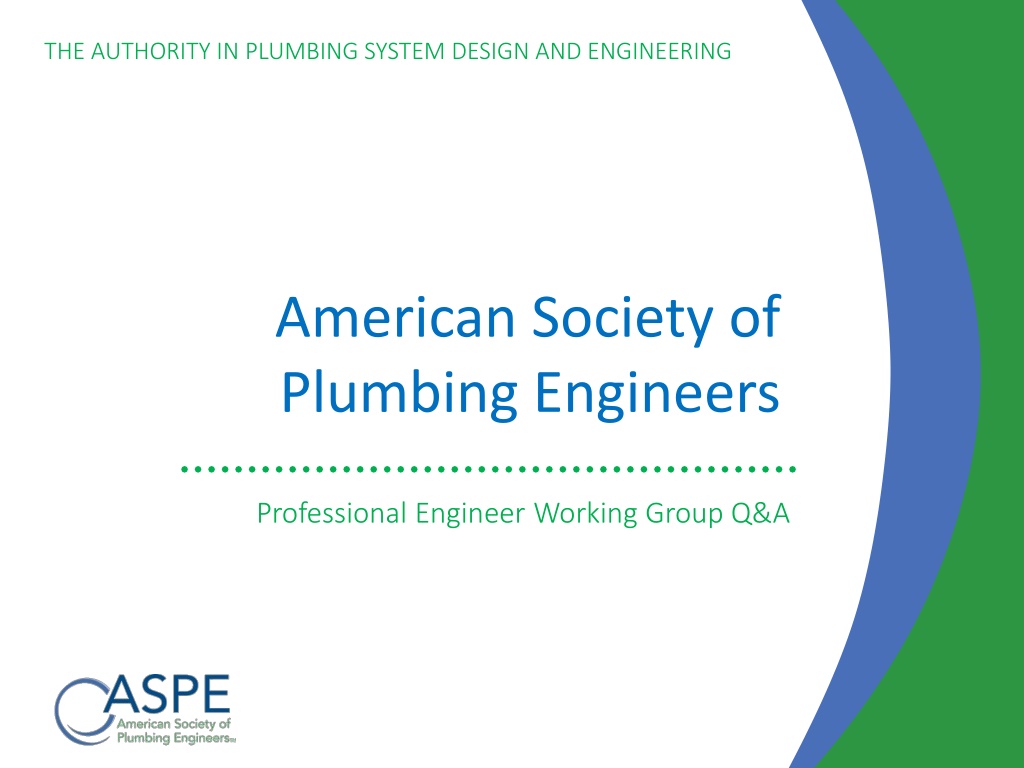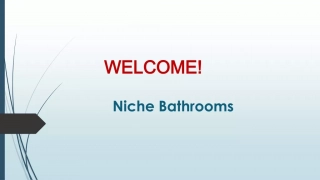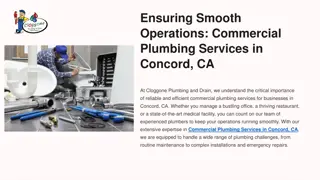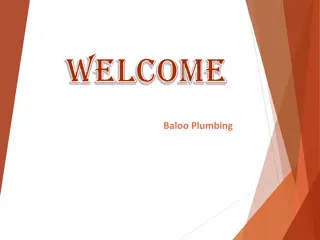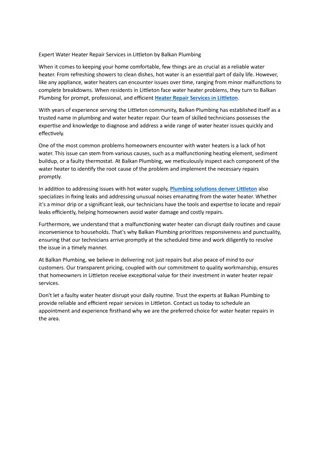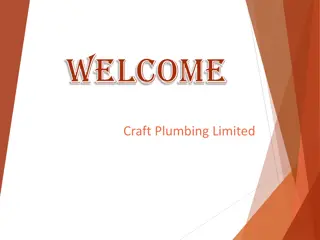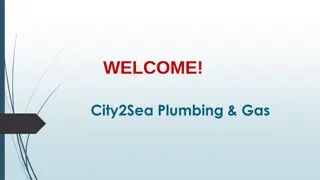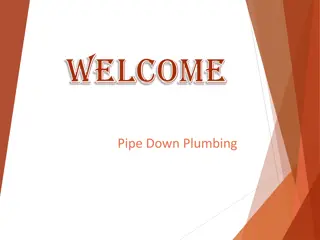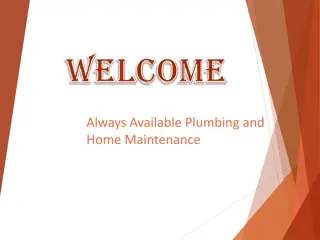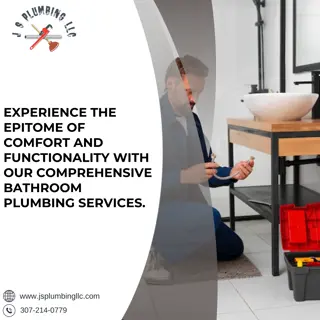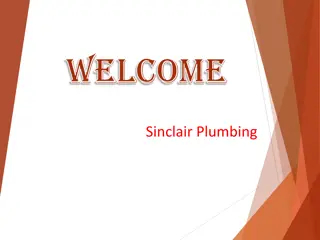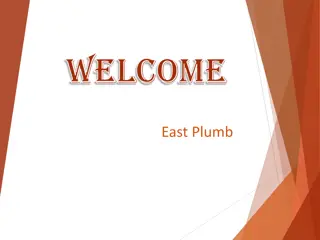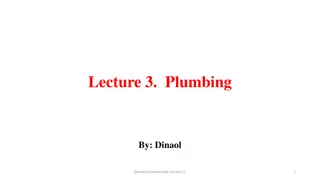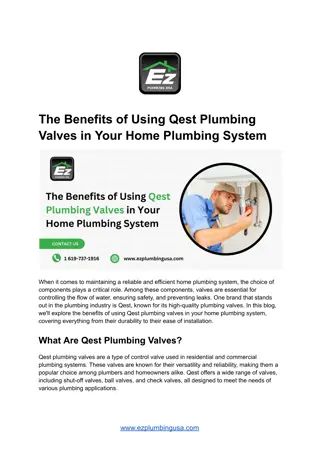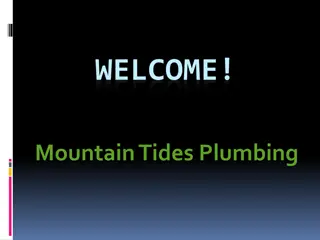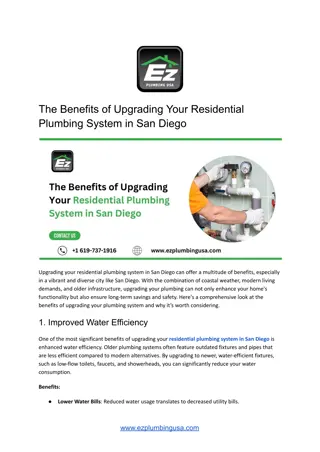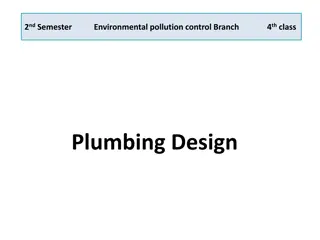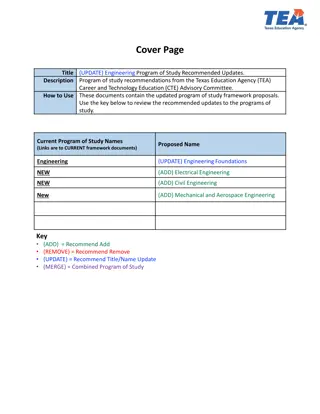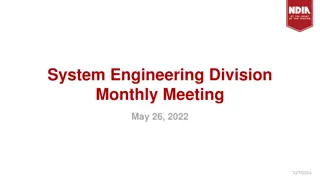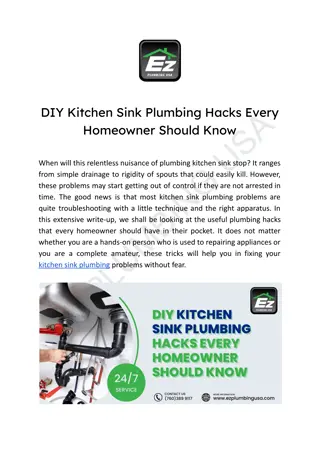Understanding the PEWG Initiative in Plumbing System Design and Engineering
The American Society of Plumbing Engineers (ASPE) has introduced the Professional Engineer Working Group (PEWG) to propose a plumbing option for the Mechanical Engineering Principles and Practice examination. This initiative does not aim to create plumbing engineering as a stand-alone discipline but rather to enhance the expertise of Professional Engineers in the field. NSPE supports this initiative, advocating against discipline-specific titles for Registered Engineers.
Download Presentation

Please find below an Image/Link to download the presentation.
The content on the website is provided AS IS for your information and personal use only. It may not be sold, licensed, or shared on other websites without obtaining consent from the author. Download presentation by click this link. If you encounter any issues during the download, it is possible that the publisher has removed the file from their server.
E N D
Presentation Transcript
THE AUTHORITY IN PLUMBING SYSTEM DESIGN AND ENGINEERING American Society of Plumbing Engineers Professional Engineer Working Group Q&A
THE AUTHORITY IN PLUMBING SYSTEM DESIGN AND ENGINEERING The American Society of Plumbing Engineers (ASPE) has established the Professional Engineer Working Group (PEWG) to develop a program for the placement of a plumbing OPTION within the framework of the Mechanical Engineering Principles and Practice (MEPP) examination. This exam is developed by the National Council of Examiners for Engineering and Surveying (NCEES) and is administered by the various state boards of registration/licensure. The following presentation attempts to answer many of the most frequently asked questions associated with this initiative.
THE AUTHORITY IN PLUMBING SYSTEM DESIGN AND ENGINEERING Specifically, what is the PEWG proposing? The PEWG is proposing that a plumbing OPTION be placed within the MEPP examination. This option would stand alongside the current options of HVAC and refrigeration, machine design, and thermal and fluids design.
THE AUTHORITY IN PLUMBING SYSTEM DESIGN AND ENGINEERING Is this an attempt to create plumbing engineering as a stand-alone discipline? The PEWG cannot emphasize enough that NO made to establish plumbing as a stand-alone discipline (like mechanical, electrical, fire protection, civil, or structural engineering) or as a state-sponsored specialty. NO attempt is being
THE AUTHORITY IN PLUMBING SYSTEM DESIGN AND ENGINEERING Is this an attempt to create plumbing engineering as a stand-alone discipline? Generally, a Registered Engineer has no discipline-specific title other than Professional Engineer. Professional Engineers are mandated by law and ethics to work within their area(s) of expertise. It should be noted that the National Society of Professional Engineers (NSPE, which is supporting this initiative) has a position statement against discipline-specific titles.
THE AUTHORITY IN PLUMBING SYSTEM DESIGN AND ENGINEERING If you have a separate branch for each phase of engineering, this becomes impractical. There would be no limit to the number of branches possible.
THE AUTHORITY IN PLUMBING SYSTEM DESIGN AND ENGINEERING The PEWG is only attempting to place a plumbing OPTION within the MEPP exam as developed by the NCEES and administered by the various state boards. This would be placed alongside the existing MEPP options of HVAC and refrigeration, machine design, and thermal and fluid systems. There would be NO creation of a separate branch/stand-alone designation of plumbing engineering within the NCEES or any board.
THE AUTHORITY IN PLUMBING SYSTEM DESIGN AND ENGINEERING Should this be placed under the architectural engineering program? This was considered and rejected by the PEWG. As some states do not recognize Architectural Engineering at this time, it was felt to best place it within Mechanical Engineering.
THE AUTHORITY IN PLUMBING SYSTEM DESIGN AND ENGINEERING Will current licensed engineers need to be grandfathered (as was the case with fire protection)? There will be no need to grandfather any Registered Engineer under this initiative. As long as an individual is a Registered Engineer, is practicing within his/her area(s) of expertise (as mandated by the various state boards), and has demonstrated a satisfactory competence in plumbing to their peers, they will continue to be able to seal/sign contract documents. This will NOT Registered Engineer s practice or placing undue hardship on any engineering concern. NOT change, and the PEWG has no interest in compromising any
THE AUTHORITY IN PLUMBING SYSTEM DESIGN AND ENGINEERING Was the establishment a specialty qualification certification, similar to ASHRAE s certifications for energy, commissioning, etc., or a NICET program considered by the PEWG? ASPE s CPD and CPDT certifications do give some measure of the competency of a plumbing designer, but remember: these are certifications and not a license. Based solely on the possession of these certifications, CPD and CPDT holders are not in any way empowered to present themselves as engineers, are not permitted to perform any act or right as governed by the licensing laws, rules, and regulations of any state or province, and are not making any professional commitment of legal and ethical conduct.
THE AUTHORITY IN PLUMBING SYSTEM DESIGN AND ENGINEERING Was the establishment a specialty qualification certification, similar to ASHRAE s certifications for energy, commissioning, etc., or a NICET program considered by the PEWG? Registration would allow those engineers who have obtained a qualifying degree from an ABET-accredited course of study and the requisite experience under the responsible charge of a Registered Engineer to ultimately sit for the Mechanical Engineering PP exam and take this exam under the option of plumbing.
THE AUTHORITY IN PLUMBING SYSTEM DESIGN AND ENGINEERING Was the establishment a specialty qualification certification, similar to ASHRAE s certifications for energy, commissioning, etc., or a NICET program considered by the PEWG? By providing a path to professional registration (which does not exist in our discipline), those who choose to practice in our discipline will have a viable career path to licensure, which can only make a career in plumbing much more attractive (and as older practitioners within our discipline are retiring, the need for new blood is becoming more and more acute). We also will have a measurable level of competency established and, most importantly, the health, safety, and welfare of the public at large will be addressed.
THE AUTHORITY IN PLUMBING SYSTEM DESIGN AND ENGINEERING Wasn t the establishment of the CIPE, CPD, and CPDT meant to serve as a step to professional registration? Contrary to popular belief within the membership, the establishment of the (now-defunct) CIPE as well as the current CPD and CPDT was never intended to serve as a shortcut to professional licensure. At a minimum, candidates for licensure must obtain a BS degree from an ABET-accredited field of study, pass the NCEES Fundamentals of Engineering examination, obtain a minimum of four years of practical experience under the responsible charge of a Registered Engineer, and pass the NCEES Principles and Practice examination.
THE AUTHORITY IN PLUMBING SYSTEM DESIGN AND ENGINEERING Mechanical does not mean HVAC. Plumbing and HVAC are two of many disciplines under the overall category of mechanical. But there are distinctions for HVAC and refrigeration, machine design and materials, and thermal and fluids design, and each of these exists as a subset within the MEPP exam. While thermal and fluids design does touch on some of the basics of our discipline, neither it nor HVAC fully addresses the growing complexity we are seeing within plumbing.
THE AUTHORITY IN PLUMBING SYSTEM DESIGN AND ENGINEERING How many potential test-takers does ASPE expect to take the plumbing option if developed? That is a difficult question to answer with any certainty. Plumbing is a subset of mechanical engineering in that it deals with fluid flows and heat transfer but in forms that can be highly specialized within the nature of plumbing systems. Based on NCEES most recent report on PE pass rates, the 24 available exams cover the broad topics of the big four: mechanical, electrical, civil, and chemical engineering. First-time takers run from a high of 2,152 (Civil: Structural) to a low of 16 (Software Engineering).
THE AUTHORITY IN PLUMBING SYSTEM DESIGN AND ENGINEERING How many potential test-takers does ASPE expect to take the plumbing option if developed? Looking specifically at mechanical engineering, there are currently three subset exams: HVAC and Refrigeration (982), Mechanical Systems and Materials (866), and Thermal and Fluids Systems (1022). Fire Protection is a stand-alone exam with 147 first- time takers. We estimate that plumbing should attract 50 to 150 first-time takers once it is developed and placed into the NCEES exam process.
THE AUTHORITY IN PLUMBING SYSTEM DESIGN AND ENGINEERING Are there any EAC/ABET-accredited engineering programs that offer plumbing engineering as a degree option or specialization? If so, how many? There are currently no EAC/ABET-accredited programs dedicated to plumbing, but the same is true for the HVAC option within the Mechanical Engineering PP exam. The University of Wisconsin Madison does have technical electives in plumbing within their Civil Engineering program. Once ASPE has enough state boards willing to support an option within the Mechanical Engineering PP exam, our efforts will turn to expanding the offering of technical electives related to plumbing within numerous colleges and universities (not to create a stand-alone four-year program in plumbing engineering).
THE AUTHORITY IN PLUMBING SYSTEM DESIGN AND ENGINEERING Does ASPE have any data on the number of college graduates who are currently pursuing degrees that specialize in plumbing engineering? EAC/ABET-accredited degrees are focused on the underlying science, physics, and critical thinking of engineering. The application of that EAC/ABET-accredited degree does not generally occur until a degreed engineer joins the workforce. Once the degreed engineer begins to apply their basic knowledge, under the responsible charge of a Registered Engineer, they move into a specialty such as plumbing or HVAC. ASPE is working toward having plumbing electives placed within engineering programs.
THE AUTHORITY IN PLUMBING SYSTEM DESIGN AND ENGINEERING Does ASPE have any data on the number of college graduates who are currently pursuing degrees that specialize in plumbing engineering? However, in our experience, such options do not educate or train an engineer in the application of engineering principles specific to a design specialty (plumbing, HVAC, electrical systems, etc.). Consider: There are engineers that took HVAC options while earning their degree. While they did take additional classes in fluid flow and heat transfer, they were not specifically educated on HVAC system design. It is also our experience that while adequate means exist of verifying the competency of candidates who are practicing within (for example) HVAC and fire protection, no such means exist for verifying the competence of those individuals who are practicing within the discipline of plumbing.
THE AUTHORITY IN PLUMBING SYSTEM DESIGN AND ENGINEERING What unique knowledge and skills that are important for safeguarding the public s health, safety, and welfare are not covered in the Mechanical PE exam? If one uses the standard definition of plumbing as the apparatus (as piping and fixtures) concerned in the distribution of water in a building and the transportation of sanitary and waste fluids, unique knowledge and skills encompass a simple understanding of code. Note that the underlying principle of codes and/or technical documents comes from the engineering principles that are the foundation of any engineering discipline.
THE AUTHORITY IN PLUMBING SYSTEM DESIGN AND ENGINEERING What unique knowledge and skills that are important for safeguarding the public s health, safety, and welfare are not covered in the Mechanical PE exam? However, the design of plumbing systems, beyond the standard definition, requires a deep understanding of the interaction of such systems within the environment in which they are being applied. The more technical plumbing systems require greater knowledge and skills, such as medical gas, water distribution on a macro scale, an understanding of water processes, etc.
THE AUTHORITY IN PLUMBING SYSTEM DESIGN AND ENGINEERING Consider the City of Flint, MI, in which appropriate evaluation of the impact of switching water systems was neither understood nor considered. Changing the pH of the water allowed lead to be stripped from the existing piping and enter the drinking water of the consumer. This has and will continue to have a negative impact on the public s health, safety, and welfare (which is the paramount, and underlying, concern that ASPE is attempting to address).
THE AUTHORITY IN PLUMBING SYSTEM DESIGN AND ENGINEERING Legionella continues to have an adverse impact on the public s health, safety, and welfare. Initially this was thought to be associated with HVAC cooling towers, and in some cases continues to be. However, a Legionella bacterium is a naturally occurring condition in all water. The lack of understanding as to how to adequately monitor and control such bacterium within water will continue to have a negative impact on the public s health, safety, and welfare. This is another issue in which plumbing engineers play an important role in minimizing or eliminating public health problems.
THE AUTHORITY IN PLUMBING SYSTEM DESIGN AND ENGINEERING A 19-year-old Kansas resident is now a student at the Kansas School for the Blind following a medical gas accident during a 2009 dental procedure. Allegedly, oxygen and nitrous oxide lines were crossed during the design and construction of the dental office in question. It is also alleged that the city, during inspections of the office, should have caught the problem. The 19-year-old is now legally blind, walking with difficulty (requiring help from a cane), and has suffered some hearing loss.
THE AUTHORITY IN PLUMBING SYSTEM DESIGN AND ENGINEERING The level of knowledge needed for modern and complex water and sanitary systems continues to increase. This continued growth in complexity will continue to mandate a need for specialized knowledge that differs from engineers who specialize in environmental conditioning. No engineer, professional, or degreed individual can. be knowledgeable of everything. That is why Professional Engineers focus on their core competencies those to which they can show specific, demonstrated, and documented knowledge before their peers.
THE AUTHORITY IN PLUMBING SYSTEM DESIGN AND ENGINEERING To summarize: Note what ASPE is proposing: placing plumbing as an OPTION under the MEPP examination as developed by NCEES and administered by the various state boards. OPTION NO NO attempt is being made to develop plumbing engineering as a stand-alone discipline within the NCEES or any state board. It is NOT NOT in ASPE's interests to restrict the practice of any Registered Engineer or place any undue hardship on any engineering concern.
THE AUTHORITY IN PLUMBING SYSTEM DESIGN AND ENGINEERING To summarize: As we understand it, as a PE one should be able to practice in any area that is within one s area of expertise and in which one can demonstrate competency therein. That competency is verified when one s peers are in agreement that the person has demonstrated sufficient knowledge in the product/work they produce. Under ASPE's proposal, this will NOT change. Current PEs who can meet this criterion WILL continue to be able to place their seal/signature on plumbing documents.
THE AUTHORITY IN PLUMBING SYSTEM DESIGN AND ENGINEERING To summarize: The ultimate goal of the Society's initiative is the establishment of a verifiable measure of competency for the discipline of plumbing and the continued, no enhanced, health, safety, and welfare of the public at large. enhanced, protection of the As design professionals, should we not be expected to do any less?
THE AUTHORITY IN PLUMBING SYSTEM DESIGN AND ENGINEERING THANK YOU for your time and attention.
